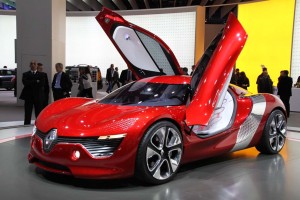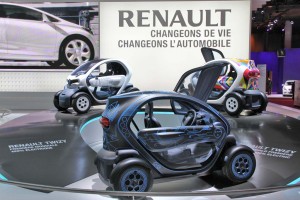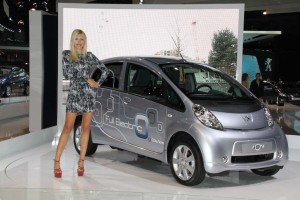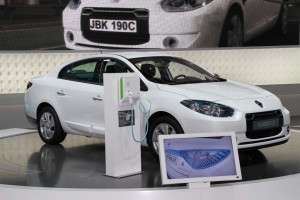In the days leading up to this month’s Paris Motor Show, French papers raised the suggestion that the event organizers consider changing its name; perhaps offered one, the Paris Electric Vehicle Show might be more appropriate.
While the idea was politely rejected, there’s no question what is formally known as the 2011 Mondial de l’Automobile is perhaps the most electrified auto show to date. Visitors to the event, which continues through the 17th, would have a hard time finding a stand that didn’t put some emphasis on battery power – from pure EV makers like Tesla to slick sports car makers, such as Lotus, which promises to offer its Formula One-derived hybrid system in an assortment of new models. Even Jaguar weighed in with the 205 mph C-X75 extended-range electric supercar.
But few makers put more emphasis on battery technology than the home team, the French manufacturers Renault and PSA Citroen, who seem to be suggesting that virtually everything they build will rely on electric propulsion – or at least offer a battery-powered option – in the very near future.
This move may underscore how government mandates can be even more critical in steering industry than actual consumer demand.
The Renault stand featured models like the Fluence, and striking DeZir Concept, as well as the quirky little Twizy. Peugeot rolled out the Ion, BB1, HR1 Concept and a number of offerings of its own, while its sibling brand, Citroen, had a number of battery models and battery-drive options for products like the upcoming DS5.
Leading the charge, so to speak, has been Carlos Ghosn, the CEO of both Renault and its Japanese alliance partner, Nissan. He is committing close to $5 billion of the two manufacturers’ money to launch an assortment of hybrids, plug-ins and pure battery-electric vehicles, or BEVs, in the coming years. That roll-out starts with the Nissan Leaf, which makes its U.S. debut late this year. But Renault will follow soon after with a version of its own.
In all, the alliance partners plan to have more than 500,000 units of BEV capacity in place by mid-decade, using factories in Europe, Japan and the U.S. And about 60% of the plant space will be operated by Renault.
Ghosn appears to be a true believer, declaring, battery technology “will change the industry.”
But there are potential marketing advantages, as well, especially when you consider that Nissan and its French partner were a day late and a dollar short when the industry first started developing conventional hybrids. Though Nissan brought an HEV version of the Altima to market it treated the gas-electric sedan like it was DOA.
Not when it comes to Leaf or the many French battery cars to follow. And clearly, Peugeot and Citroen are equally smitten.
But with industry analysts forecasting a slow migration to battery power – even the optimistic Ghosn acknowledging electric propulsion will be hard pressed to conquest 20% of the global market by 2020 – why are the French makers so gung-ho?
You might ask French President Nicolas Sarkozy. No sooner had he come into office before pledging 400 million Euros “exclusively for the research and development of nonpolluting vehicles,” which appeared to be defined specifically to mean those using electric propulsion. Last year, it added another 1.5 billion Euros (more than $2 billion at the current exchange rate) to establish an infrastructure to support electrification.
Dubbed “the battle of the electric car,” Sarkozy’s “Green Plan” covers everything from research to battery production to the set-up of a nationwide vehicle charging network.
The ultimate goal? The French government is targeting 2 million electrified vehicles on the road by 2020. By 2030, meanwhile, the ecology ministry predicts the emissions-free vehicle sector will account for 27% of the total French market.
The nominally conservative government has already strong-armed companies like Air France, AREVA and Veolia to commit to purchasing 50,000 electrics. Add planned government acquisitions and that brings the guaranteed market to 100,000 battery vehicles by 2015.
With global warming becoming a more and more accepted – and feared – concept it’s becoming harder and harder to find a major government, worldwide, that isn’t pushing for some sort of alternative to the conventional internal combustion engine. That’s especially true in Europe, where polls show the global warming threat is taken much more seriously by consumers than in the United States.
But there’s another reason for Sarkozy’s support that is pragmatic in a typically French way: the country currently operates a globe-leading 59 nuclear plants. They account for a whopping 78% of France’s power supply – and feed some of its neighbors, as well.
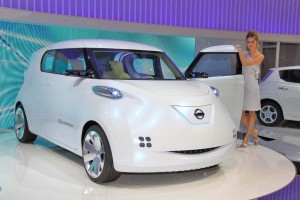
Along with its Japanese alliance partner Nissan, Renault will soon have capacity to produce over 500,000 battery cars annually.
While the debate over nuclear power might continue, the French have clearly said, “oui,” and contend this is the best way to supply power to battery vehicles which, in places like the U.S. arguably just move the source of pollution from the tailpipe to the coal-fired smokestack.
The French auto industry has had a history of doing things its own way – just think of the classic Citroen DS9. That hasn’t always paid off. And it’s anything but certain the latest push into electrification will, either. But committed the two big makers certainly are, and with the support of the French government they’re getting a significant boost at home. If the rest of the world plugs in and demand for battery-powered vehicles lives up to optimistic expectations, Renault (and Nissan) and PSA Citroen could wind up leading the charge.

